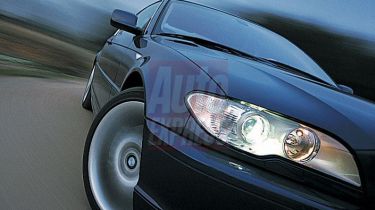BMW 330Cd Sport
The diesel engine's rise to power among luxury cars is now virtually complete. Last month saw the arrival in Britain of the first oil-burning prestige coup�, Mercedes' CLK 270CDI, which prompted fears among die-hard petrolheads that no sector of the market is safe.
BMW's new 330Cd Coupe is a major blow to Mercedes' CLK 270CDI, and even threatens to beat the M3 for all-round desirability. There is a snag, however. British drivers must wait until April 2004 to get their hands on the oil-burner, giving its Merc rival a lead in the sales race.
The diesel engine's rise to power among luxury cars is now virtually complete. Last month saw the arrival in Britain of the first oil-burning prestige coup�, Mercedes' CLK 270CDI, which prompted fears among die-hard petrolheads that no sector of the market is safe.
As part of a plan that will see eight new models launched in 2003, arch-rival BMW delivered a 150mph counter-offensive this week in the shape of its new 330Cd - the fastest machine ever to drink from the black pump.
The vital statistics make interesting reading. A top speed of 150mph and 0-60mph time of seven seconds put the coup� in a performance bracket previously reserved for the hottest hot hatchbacks and petrol-powered executive machines. In addition, the new 3.0-litre turbodiesel's power outputs take some beating. With 204bhp at 4,000rpm and 410Nm of torque available between 1,500 and 3,250rpm, the straight-six unit makes the 325Ci's petrol engine seem weedy. The motor is also markedly more powerful than the 3.0d version it replaces.
With a C02 output of 177g/km, the oil-burning Beemer comes within the same 20 per cent taxation bracket as its Mercedes-built counterpart, making it an equally attractive proposition for company car drivers. Out on the road, improvements to the car immediately become apparent. Of all the 3-Series models, only the mighty M3 gives a more potent mixture of in-gear flexibility and kick-in-the back acceleration.
From 1,600rpm onwards, the 330Cd surges forward on a relentless wave of momentum, which only subsides when the rev-limiter kicks in above 4,700rpm. In addition, a new six-speed manual gearbox delivers the optimum blend of performance and economy. At 70mph in sixth, the engine pulls only 2,100rpm, making for a claimed extra-urban fuel consumption figure of 51.4mpg. Perhaps the most significant advance, however, has been made in the field of refinement, as at tickover, the engine is eerily quiet.
When the revs increase, though, a startling fact becomes obvious. Rather than trying to disguise the engine's natural voice, BMW has nurtured it like a fledgling opera singer. And what a mighty set of lungs; the powerplant gives out a deep-chested baritone roar under hard acceleration that combines with the whoosh of the turbo to have drivers seeking out tunnels and high-sided roads so they can make the most of the rich exhaust note.
None of this would be quite such depressing news for the opposition if it wasn't for the sheer excellence of the rest of the 3-Series package. OK, the gearshift action is rather heavy and doesn't like to be rushed, but otherwise this a real five-star performance from the German giant. The steering is sweet, the grip levels sublime, and, even on the optional 18-inch 10-spoke alloys worn by our lavishly equipped Sport model, the ride and handling balance is such that the BMW can swap between focused driver's car and comfortable long-distance cruiser with no perceptible decline in ability.
Our sole criticism concerns the stylistic changes that accompany the introduction of the 330Cd to the range - and it's a look that will be adopted by the Convertible model, which is due in April. The deeper front airdam gives a more aggressive appearance, but the triangular-shaped foglamp surrounds seem a little over-the-top in an otherwise classy design. The two-stage rear brake lights are a welcome addition, though. They look good and light up more brightly during hard braking to warn following drivers of potential danger. The EU has yet to approve them, however, so it will be a while before the system is adopted by UK cars.



